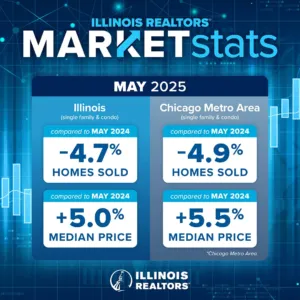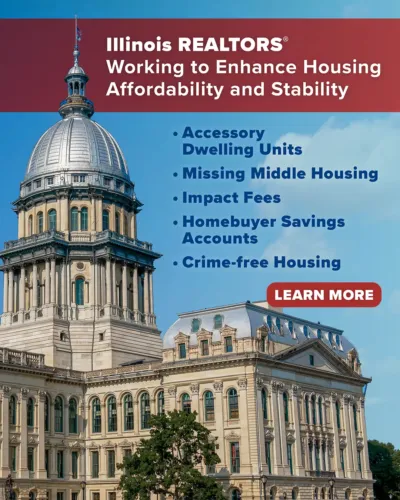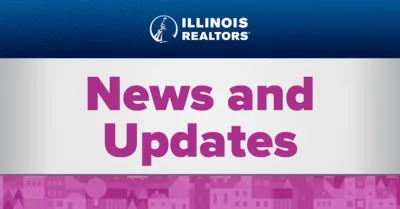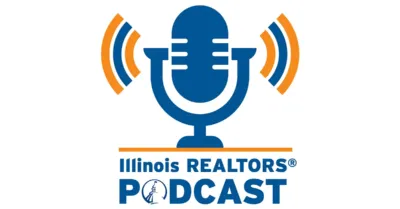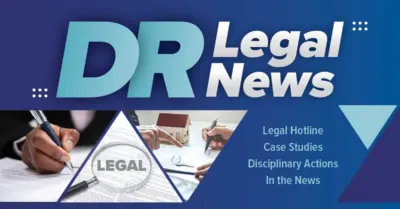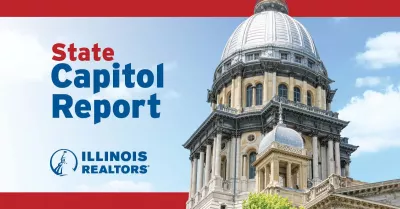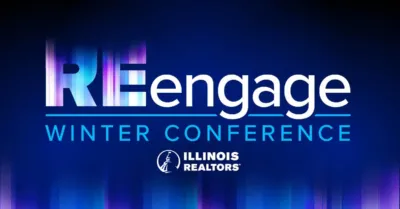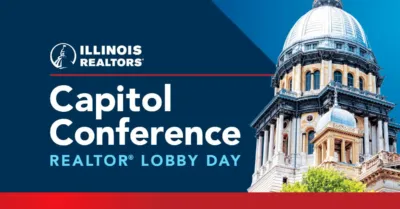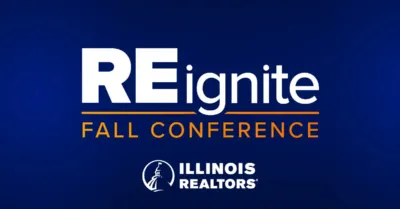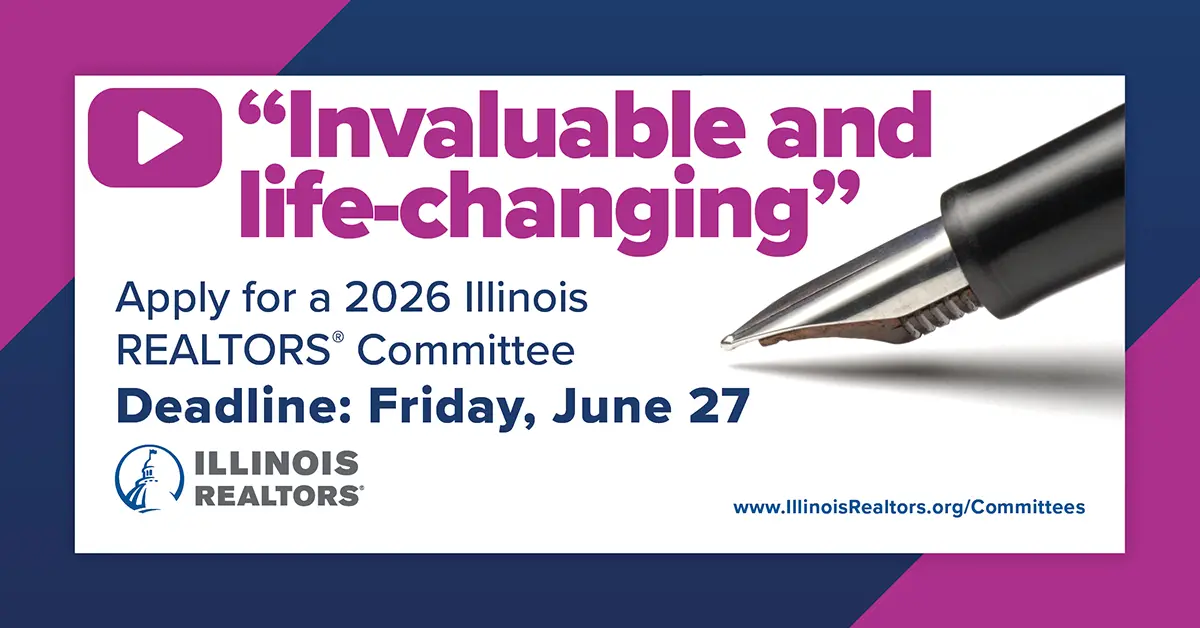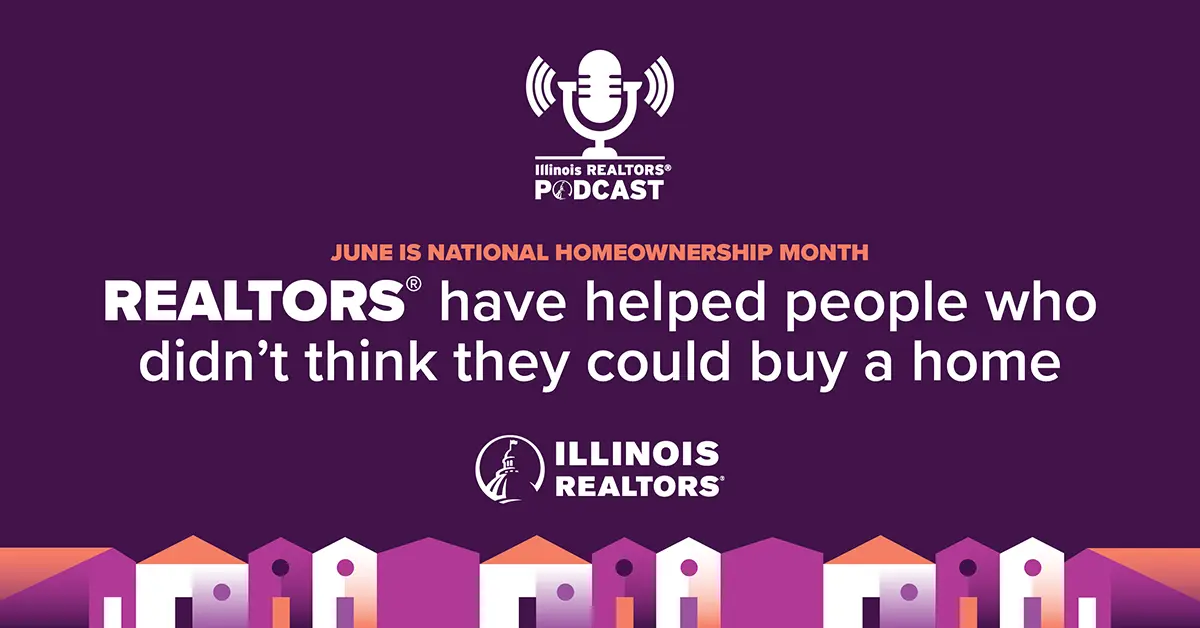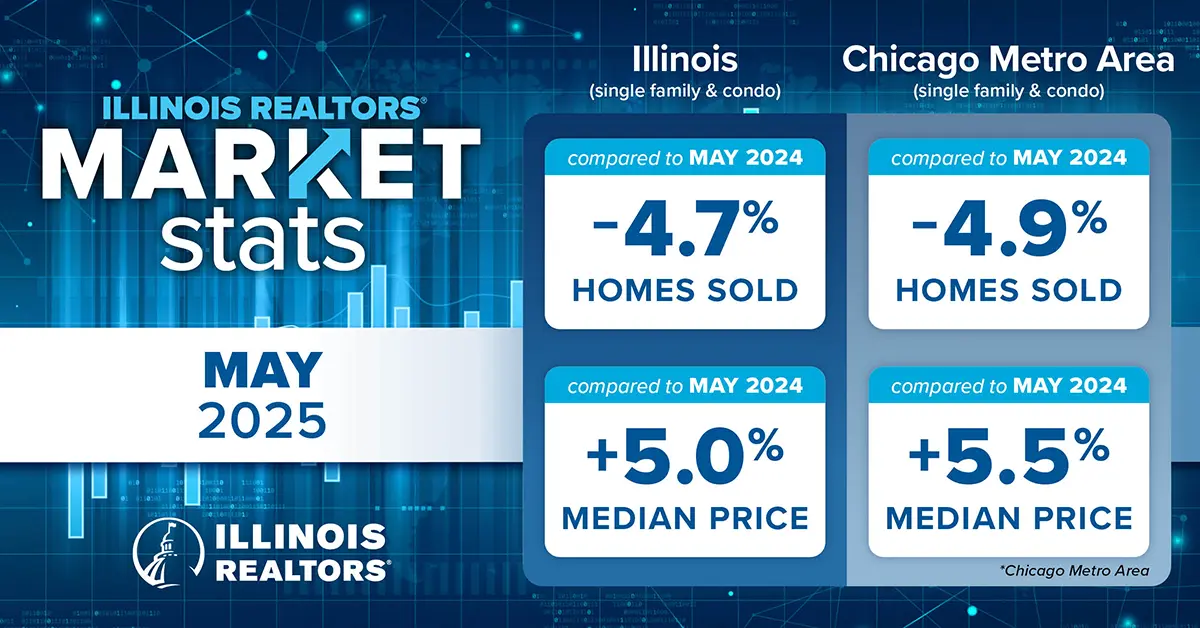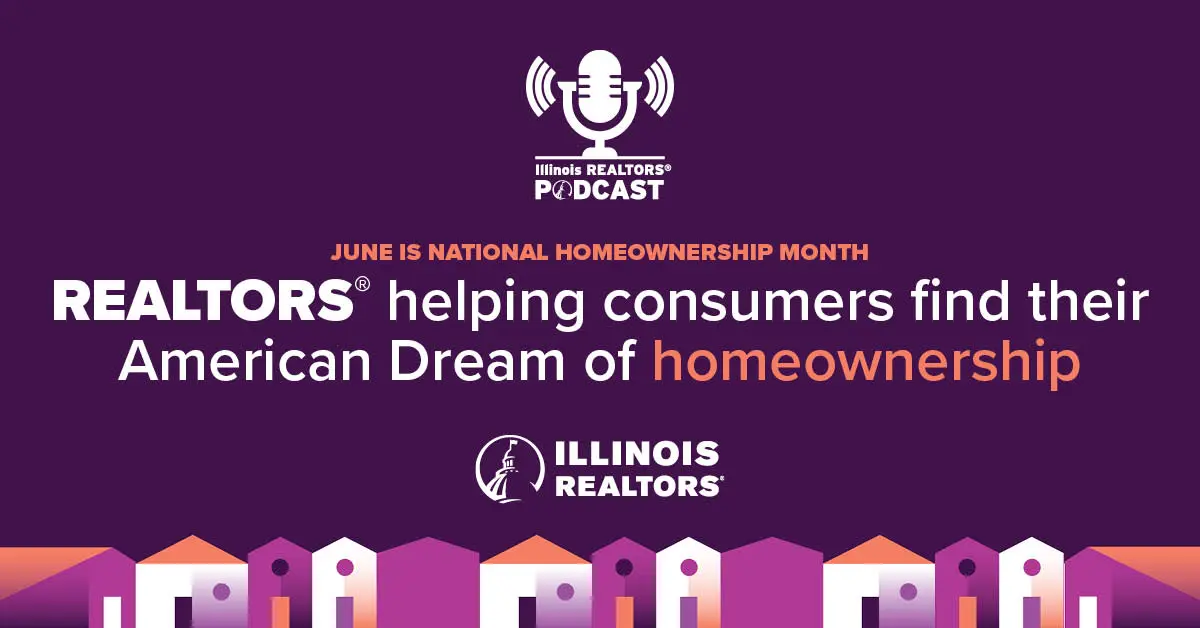Illinois REALTORS® offered a new resource to support fair and affordable housing in the state Thursday, by hosting the Illinois Young Professionals Network panel discussion, “Fairness is Opportunity – Doing R® Part.”
Here are six takeaways from the webinar:
- Down payments and low inventory are two of the most common obstacles facing home buyers today.
- REALTORS® can best serve consumers by learning about available financing programs through local, HUD-approved housing counseling agencies.
- One of the biggest impediments to U.S. military veterans buying homes is a lack of knowledge about programs designed to help them.
- A lack of sensitivity by real estate professionals and industry partners can discourage sellers from accepting offers financed by Federal Housing Administration (FHA) or Veterans Affairs (VA) loans.
- REALTORS® who make affordable housing part of their core values will have a better chance of connecting with consumers on social media because of their authenticity.
- The NAR has developed a simulated training program called “Fairhaven,” that will help members better understand and cope with discriminatory behavior.
The panel discussion was facilitated by REALTOR® Tommy Choi of Keller Williams Chicago-Lincoln Park and co-founder of Weinberg Choi Residential Team. Panelists included:
- Dionne Clifton, founder of LIVE Real Estate Group in Urbana,
- Tracey Royal, managing broker associate at Coldwell Banker Realty Oak Park,
- Rachel Scheid, branch manager of Coldwell Banker Realty in Chicago and
- Athena Williams of the Oak Park Regional Housing Center.
Illinois REALTORS® Deputy CEO Jeff Baker provided members with a summary of the association’s initiatives to promote diversity, inclusion, fair housing and affordable housing. Baker discussed the association’s efforts to create more affordable housing through a legislation package being introduced in the next General Assembly session as well as its programs to provide scholarships for minorities and grants to help brokers and their firms create customized diversity and inclusion programs.
YPN Chair Eddie Ruettiger served as moderator.
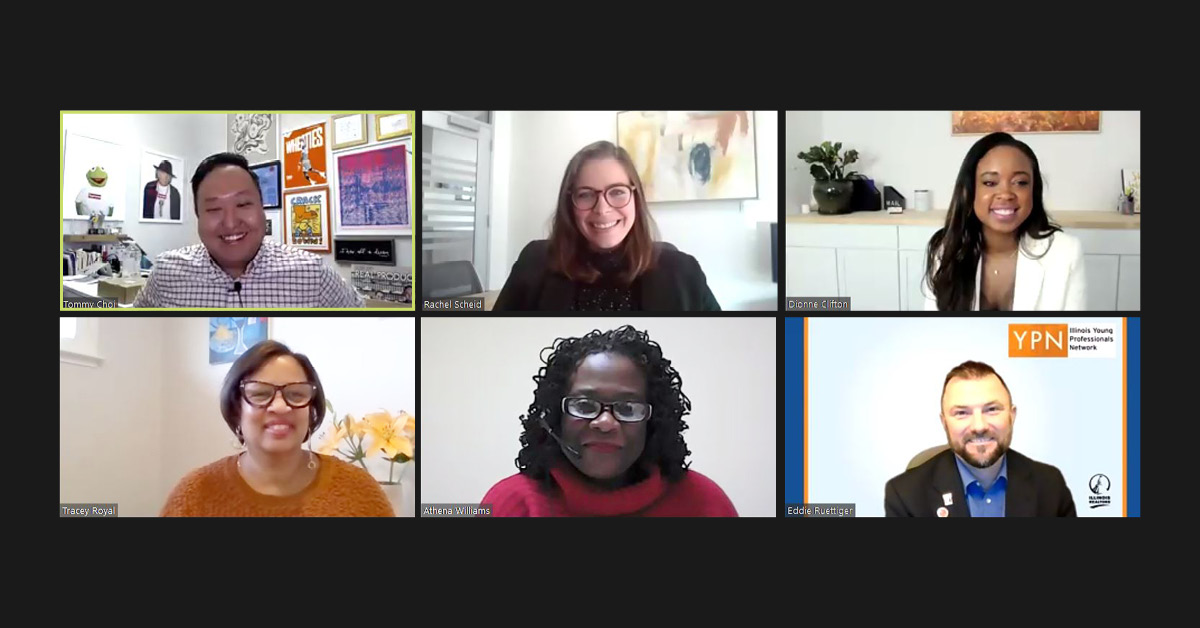
The six individuals pictured here played key roles in the Illinois YPN panel discussion Thursday, “Fairness is Opportunity – Doing R® Part.” Clockwise from top left are: REALTOR® Tommy Choi, REALTOR® Rachel Scheid, REALTOR® Dionne Clifton, REALTOR® Eddie Ruettiger, Athena Williams and REALTOR® Tracey Royal.
Full transcript:
Dana Gurnsey: Welcome to the Illinois YPN podcast, where members of the Illinois REALTORS® Young Professionals Network, or YPN, share their tips and resources for your real estate career. Our topic for this episode is on affordable housing and common obstacles home buyers face.
I’m Dana Gurnsey, Illinois REALTORS® staff liaison for our state YPN advisory board. This episode was recorded from a recent webinar Illinois YPN held this fall. Now more than ever is the time to educate, learn and grow to make a positive impact when it comes to creating real equality and housing opportunities. All communities everywhere are affected by a need for affordable housing. So we asked a few of our Illinois REALTORS® and experts who are skilled at helping consumers, including minorities, veterans, and others in protected classes, to share their insights and resources to help you find fair and affordable housing solutions to better serve your home buyers.
With that we have a great episode ahead for you guys. Next up is Eddie Ruettiger, the 2020 Chair of Illinois YPN who hosted the discussion. He is a REALTOR® with Baird & Warner in Plainfield, and also the 2021 president of his local board, Three Rivers Association of Illinois REALTORS®. So let’s jump right into it.
Eddie Ruettiger: Good afternoon. Thank you everyone for tuning in to this important discussion today. Fairness is opportunity, doing our part. Our celebrity moderator is none other than Tommy Choi, who was recently just installed as 2021 NAR Vice President of Association of Affairs. Congratulations. He is co-founder of Weinberg Choi residential team. Tommy also served as the 135th President of the Chicago Association of REALTORS®, and the first Korean American president in the association’s history. He is also past chair of the National Association of REALTORS® YPN advisory board. So, at this time I turn it over to none other than Tommy Choi.
Tommy Choi: Eddie, thank you so much. Grateful for you, and appreciate your friendship and your leadership. And really excited to see you continue to raise the bar on Illinois YPN which, no surprise, that’s one of my favorite state committees that I’ve served on. And today’s actually officially my first day as Vice President, so I’m going to try not get fired and lose this gig, and stick to the script here. But appreciate you, Eddie, and thank you to everyone that’s tuning in and joining us today, and maybe even those that are catching this on the replay.
Today’s conversation is an important one that we need to continue to have. And when I think about fairness , that word fair, the first thing I think about, believe it or not, is baseball. One of my favorite sports to watch. And I’m not talking about the Houston Astros, because there’s nothing fair about what they did in the past. But fair in general, because of the standards that they have, right? In baseball home plate is 17 inches wide. Whether you are a six year old playing Little League Baseball, or you’re a adult, grown adult playing in the major leagues, right? Like a team like the Chicago Cubs, the best baseball team in the world. It doesn’t matter what age you are, home plate is 17 inches. Right? And if you’re a pitcher and you suck and you can’t find the strike zone, there’s no changing for 18, 19, 20 inch, a wider plate. You get sent down to Minors to work on your craft and become better. Right? Home plate is 17 inches.
And why I bring this up is because we know when we talk about affordability, fairness in our housing market, our industry, home plate hasn’t been 17 inches wide for everyone. And conversations like today help us and educate us, and continue to help grow to become closer to that day where home plate can be 17 inches for everyone when it comes to housing needs. And that being said, I’m super grateful and honored to be here. But really to be able to help facilitate a conversation with this powerhouse panel rock stars here in our industry. So I want to go around and introduce everyone. First and foremost, Dionne Clifton, REALTOR® from Urbana, Illinois. Hey Dionne.
Tracey Royal out of Chicago who is a past chair of the Affordable Housing Committee, and she was the most recent Presidential Medallion Award winner from the Illinois REALTORS® this past September. Flex on them, Tracey. Love that. When I grow up I want to be Tracey Royal. And then another Chicagoan, Rachel Scheid, a 2020 YPN board member, and member of the Affordable Housing Committee, and also a leader, not just in the industry, but for her company as well. And last, and of course not least, Athena Williams who was the executive director of the Oak Park Housing Center.
Ladies, welcome. I want to start this off and ask you all quickly. I’ll start with Dionne, how are you doing right now? Everything good? Tell us what’s going on in your world.
Dionne Clifton: I’m doing fantastic. I’m really choosing to remain thankful. 2020 has presented us all with very interesting challenges, but the real estate industry specifically here in Illinois has been fantastic. People are definitely displaying a need for our services, which I think is amazing and a blessing. I always joke that all this time at home has made people realize they need a place to put their kids, so it’s been really good for the industry. And we are all still working really hard and working together, and I’m really inspired by just people in our industry and how well we’ve been working together and how supportive everyone’s been through this.
Tommy Choi: I love that. And if anyone is looking, I have three daughters I’m looking to unload on. Especially today, they haven’t been really great listeners, but neither have I so it’s okay. Athena, how are you? How is everything in your world?
Athena Williams: I’m doing well, thank you. As the executive director of a housing center, a HUD approved housing center, we’re seeing a lot of shifts, such as Dionne just stated. We’re seeing a lot of people that want to become homeowners.
Tommy Choi: That’s great. That’s great. Rachel, talk to me. How are you doing?
Rachel Scheid: Staying grateful for the health and safety of me and my family. And echoing Dionne and Athena, it’s a super busy time here in Illinois. As our CEO of Illinois REALTORS® said, we have been an essential business this entire year, which is kept all of our REALTOR® colleagues busy. I do a lot of coaching for the agents in my office, so that has been keeping me extremely busy but I am very grateful and excited to see all of our realtors businesses grow.
Tommy Choi: Love that. And Tracey, I was hoping you’d be in your greenhouse. But it’s a little chilly outside for that, right?
Tracey Royal: Yeah, it’s a little windy and I don’t want to get blown away to Oz, so in the house I’ll be for the rest of the day. But things are great. I’ve been busy, I agree with everyone else here that have spoken about times. It’s challenging times, new spaces, but I always look at times like this as a way to be creative, room to make or create opportunities, and just another way of being thankful and grateful and not taking for granted the smaller things in life. So family’s doing well, everyone’s well and I can’t hope for anything more than that.
Tommy Choi: Love it. Love it, all four of you had that mindset of abundance and looking through that lens of gratitude, which I can appreciate and love. So we have the next 25-ish minutes to really dive into this. And so how I want to really lead this conversation, or allow you all to lead the conversation, is chunking this conversation into three different buckets here. First, I’d love to just start off and talk about the challenges when we talk about affordable housing and fairness and whatnot, and then shift that into resources that are available to help bridge that gap. And then end with the educational piece, right? Our REALTOR® family, our community. And even to our clients and the consumers out there, how do we spread the word and extend that reach?
So I want to start off with you, Tracey. When we talk about wider access of home ownership, right? What are our biggest hurdles right now that you feel that we face?
Tracey Royal: I think right now some of the biggest hurdles is of course, we have this notion of we’re in the season of low inventory, there are not enough houses to go around for buyers. Which inadvertently puts our consumers into multiple offers situations where highest and best. And that is just a bucket of disappointment all by itself. But what we need to do is be more intentional and more strategic about giving access, giving our clients access to funding. The average buyer right now, they struggle with down payment. And I don’t think that a person should not have the or be afforded the opportunity to at least try to become homeowner, because they can’t afford it. So I think one of the biggest challenges is that we have to first find out, and be more knowledgeable as REALTORS®, on what programs are available. And then we need to be more intentional and strategic about marketing that information to our consumers. We need to be more intentional about building our relationships with the folks who actually generate this money. We need to strengthen those relationships so it’s sort of a partnership. And we’re all working collectively together to increase home ownership a lot.
Tommy Choi: Love that. Dionne, how about you? What are you seeing in your market as far as challenges when it comes to really widening the funnel when it comes to access of becoming a homeowner?
Dionne Clifton: Yeah, so I’m going to just kind of double down on what Tracey said, definitely down payment. Freddie Mac did a study and indicated that 49% of renters think down payment is the main reason why they’re not homeowners, and something like maybe 30% of homeowners don’t want to buy another house for the same reason. So that’s definitely a hurdle. For me, something that I’ve become passionate about recently is student loan debt. I have student loan debt, a lot of my clients have student loan debt. And the way Fannie and Freddie have structured the way lenders calculate student loan payments towards debt to income ratios has really become a big barrier for a lot of people who do have student loan debt. And this is problematic because black students are over 50% more likely to hold student loan debt, or to hold more student loan debt. So this is creating more barriers for a specific class that we consider protected. So that’s something I’m really interested in, and seeing how we can make sure that the student loan debt is not creating an implicit bias, so that homeownership is something that is attainable for everyone.
Tommy Choi: That’s a really great point, and I appreciate you bringing that up because I do think that is true when it comes to that that implicit bias, especially for anyone that is coming out of college or even a master’s program or whatnot. Rachel, I want to ask this question but differently to you because, sifting it down a little bit more for another protected class, I know that you have a lot of experience with the military when it comes to veterans. Where do you see hurdles with home ownership for veterans?
Rachel Scheid: Sure. So I’ve worked with VAREP, which is the Veterans Association of Real Estate Professionals, for quite some time now. They’re a national organization that really works to educate veterans on their home ownership and home affordability options. One of the biggest hurdles I see in veteran home ownership is just the lack of education around what the VA home loan product is, and how to best utilize that benefit. What we often see among the veterans is this very humble attitude, which I respect immensely, but a lot of times that means they don’t lead with the fact that they’re veterans. And up until recently loan officers weren’t required to ask them, “Are you a veteran? Can I help you facilitate a VA home loan?” And so a lot of veterans didn’t realize that that was something they could take advantage of.
In conjunction with that, a lot of times what we see is our fellow REALTORS® don’t understand what that VA loan product is. So there’s a lot of bias that comes into play, as a listing agent, when you receive an offer that is 100% financed. And how you present that to your seller when you have multiple offers, and maybe one’s putting 20% down and one is the VA putting 0% down. And so one of the things that I worked really hard on, and I know the panelists on here work hard on as well, is making sure that our fellow REALTORS® understand how best to explain those loan products to their sellers, and their buyers, to make sure that you don’t have implicit bias on the table when you’re presenting those offers to your clients.
Tommy Choi: You know I love that you brought that up, and before I ask the same question to you, Athena, because I’d love to see your side and perspective from it. Rachel you bring up a good point, I want to ask you, Tracey and Dionne, there is the stigma when it does come to VA loans, or even FHA loans, right? Especially in competitive situations, right? Where it’s something that is going to be a hurdle for the seller to get over, and there’s this just stigma that’s out there. What do we do? How do we do this as REALTORS®. Outside of the educational piece. To really bridge that gap and get over that, so that you know we can really level set that the playing field here when it comes to that? And especially in competitive situations. Tracey, any thoughts?
Tracey Royal: Yeah, I think really a lot of it is just education. Not only education from the standpoint of consumers being educated about the product, but us as REALTORS®. We, again, and to Rachel’s point, we have to be able to educate a seller, maybe educate a seller prior to them so listing their property. “Hey, here are some of the things that you can do to prepare, so that you can be fair across the board,” and say “Hey, these are the specific pool of buyers that are going to come to the table once we list. We don’t want to ward anyone out, we want to give everyone a fair opportunity. And here is a way we can do that, by preparing the seller to maybe correct some of those things that do become an issue in terms of the appraisal.” So I have to stick with education. Consumers don’t know what they don’t know, and they rely on us as the experts to teach, to guide and make recommendations.
Tommy Choi: I love that. And you nailed it on the head, right? Consumers rely on us as the REALTORS®, right? The adviser.
Tracey Royal: Yes.
Tommy Choi: Solution, right? We can be the roadblock or we can be the gate that opens that up to really bridge that. So Athena, I’d love to ask you the same question. Challenges you see on your side when it comes to affordability and home ownership access?
Athena Williams: So some of those challenges, including, to piggyback on what Tracey and Rachel and Dionne mentioned, is the lack of education. But again, it’s not just the lack of education on behalf of the consumer, it’s the lack of education on, I’m just going to say it, all of our industry partners. So we’re all in this industry of real estate together. And when I say lack of education… And sometimes it’s not even lack of education, it’s lack of sensitivity. Because someone just put in the chat box about removing certain choices from the MLS, and I have to attest to that because we’ll have clients that come in, and they’ll come in with the listing because when we sit down with them we go through everything about affordability. And so a lot of times we need to have an idea of what particular community they want to look at. And they’ll have a listing that says no FHA loans. Or no VA loans. So in our world, because we do a lot of fair housing education, that’s just as bad as saying no section eight voucher, or no mother with four children when you specify.
So to me, that’s a challenge because it seems like whoever is in control of how that MLS is created needs to address some of those particular issues. And I actually recently had a conversation with Tracey, so I’ll just share. So I finally decided to purchase a home. I’ve been buying two plus multiple unit properties, but due to COVID my daughter came home, my mother moved in. I said “I need just a single level space.” And I finally went through the process myself. And going through that process I found a lot of quirks that really needs to be handled differently from the, not so much the seller, not so much the buyer, not even the REALTOR®, just in the industry period. Because even though we teach our buyers that they should get a home inspection, well, to me, I paid for three home inspections, it looks to me the home inspector should be working with the developer. To figure out what they should or should not do when they rehab that property.
So there’s a lot of challenges that need to be addressed. And I’ll be working with Tracey and hopefully Rachel, and anyone else that’s in the Chicago market, so that as a team we can work together as industry partners and industry professionals.
Tommy Choi: I love that. And I appreciate you keeping it real because that’s what this is about. We want to be transparent and have that real conversation. Hopefully people, some people are squirming or feeling uncomfortable, because we know that that’s the growth kicking in. Athena, I want to keep it with you now. And I want to talk about, especially with the recent election that just happened a couple weeks ago, your perspective when it comes to the future for HUDs newest rule, right? The preserving community and neighborhood choice. And then we talked about Biden and Harris’s stand on reinstating the Affirmatively Furthering Fair Housing piece of it, and just get your thoughts.
Athena Williams: So I’m glad you asked. So Oak Park Regional Housing Center is a 48 year old nonprofit agency that was built on the foundation of the Affirmatively Furthering Fair Housing before it was even a phrase. And we did that because of the fact… Let me clear something, I wasn’t here 48 years ago when they did that.
Tommy Choi: I was going to say…
Athena Williams: But it was done in a way to help Oak Park to become that welcoming community, in an effort to help other people understand that they have options for housing. Okay? So make it welcoming, hope people come in, and what that did was it actually helped the community improve its market value. Because many people know that Oak Park is one of the most integrated communities in the nation. When you Google integrated community, you get Oak Park. And it was our agency that helped that process. So with that being said, the fact that the new administration has reinstated that, it helps us now be able to, particularly with the new… I shouldn’t say new. But particularly with the expansion of the Black Lives Matter movement, it helps us now to be able to go out and help others understand that you have multiple choices for housing. You don’t have to be locked into one particular community, particularly communities that have been disinvested. Disinvested in. So you have options, and it helps, agencies like ours that actually promote and support fair housing, help consumers understand the law, help consumers understand their options and help them know that they have multiple expanded options. So I’m happy that it was reinstated and I look forward to really pushing the needle in the communities that our agency serves when it comes to fair housing.
Tommy Choi: Love that. Well you know what? Let’s make this the Athena Show right now. You talk about resources, can you just dive a little bit deeper in what the resources that are available for homeowners?
Athena Williams: Sure. So the first resource that all homeowners… And I’m going to stress all because I’m on a mission to try to make that happen. So 2021, Tracey and Rachel and Dionne, we’re going to try to make it happen. All home buyers should really go to a HUD approved, and I’m going to say HUD approved again, HUD approved housing counseling agency prior to actually even looking at a house. When they get the first notion that they even think they want to become a homeowner, we like for people to come into a HUD approved housing counseling agency.
So I want to say in early 1960s HUD actually set up the housing counseling program, due to the fact of redlining. Okay? And it was also due to the fact that the redlining, the discrimination that was taking place, the laws that were not being followed, there were people that were signing land contracts and they were being taken advantage of. So that’s why the HUD approved housing counseling agencies were developed. And what we do, we sit down with the home buyer, and we literally take them through a financial assessment first to really see how much they can afford with their finances, and we then we take them through a mortgage readiness assessment to see how much mortgage they can afford to pay and then still have residual income. And then after that we literally vet them with multiple REALTORS®, multiple lenders, multiple inspectors, to make sure that they go through the entire homebuying education process thoroughly. We take them through that education piece, it’s a six to eight hour class either at one time or multiple two hour classes, where they have an opportunity to meet with those industry professionals so that they can learn firsthand what’s expected of them.
And so that’s the greatest resources when you work with a HUD approved counseling agency, because we offer all of the products. When we talk about down payment assistance, my staff is charged to know all the down payment assistance programs out there. So someone walks in, after we run their credit, and we run their credit with a soft credit pull, we’re able to figure out and match them with the down payment assistance that works for their profile. So to me there’s only one resource, that HUD approved housing counseling agency, but once the buyer comes into that agency they learn everything they need to know about home ownership. Even, because I know what your next question is Mr. Choi, even when it comes to foreclosure.
Tommy Choi: Love it. So you heard it here first, right? We’re going to listen to Athena and take her advice, everyone start with the HUD counseling agency.
Athena Williams: Yes.
Tommy Choi: Right? Let’s do that and go ahead, Athena. I didn’t mean to cut you off.
Athena Williams: I was going to say I know I stressed my REALTOR® out when I was looking for a house, so I can imagine, and I understand now what you all go through. So I apologize for all the homebuyers and what you go through, but I know we love our jobs and we love helping people so that’s why we do what we do. But as housing counselors and HUD approved agencies, our job is to try to make that just a little bit easier for you. So imagine if they come into the office with us first, before they even come to you, they have a little better sense of what their project or what their purpose is and their home buying journey.
Tommy Choi: So now you understand why all good REALTORS® have a therapist, Athena. Right?
Athena Williams: Right.
Tommy Choi: They need someone to mentally unload and become right once again.
So I’m going to direct this one to Tracey, but it’s open to everyone. When we talk about these resources, right? Do you feel there’s particular areas, counties, cities, where these resources are more impactful and helpful or needed in?
Tracey Royal: Absolutely. I think first off we should start looking at our underserved communities. I can’t tell you how many times I’ve had clients who want to stay in a community that they grew up in, they still have family and relatives, they are very vested in the community, but they feel for some reason that they can’t afford it. And I know after talking and working with Athena, that there are programs specifically designed to encourage home ownership in blighted areas and underserved areas per census zip code or what have you. But if they don’t know about it, the first notion is that they have to move far away or they have to disrupt their entire lives. So it’s been incumbent upon me to, again, really vet and be strategic about the relationships that I build with my lenders, and not just say, “Hey, I’m going to send you three lenders and then have at it.” I make sure that I vet them myself, and I asked them deep dive questions. What type of programs do you have? How do they function? What are the requirements? So that it’s a partnership. It’s a partnership. We all know that if we don’t have thriving communities, businesses, commercial, our industry doesn’t thrive. If someone wants to maybe jump in and speak to how beneficial we have the commercial side of our industry that helps to strengthen communities when people buy homes. I mean it’s a collective effort.
Tommy Choi: You know, since you said it, I want to merge a little bit then come back to it. The commercial piece, Rachel is there anything you want to add to that?
Rachel Scheid: Yeah, I mean I think thanks for teeing me up there, Tracey. But I think when we talk about affordable housing, we also have to remember that a large part of that is accessibility. Accessibility to grocery stores, libraries, banking institutions, health care centers, hardware, restaurants, clothing stores, all of that. People want and need to live in communities where their needs and necessities can be met. That’s commercial real estate. And often we as REALTORS®, and a lot of us are residential REALTORS®, myself included, can sometimes forget that that’s a huge part of it. And I think this year, more than ever, we’re seeing how important commercial real estate is to our communities. In Chicago we’re seeing it in a lot of different reasons, not just because of COVID.
So we would be remiss on this panel if we did not also highlight the importance of ensuring fair and equitable assessments of taxes and property values in the commercial landscape. There needs to be more opportunities for minority business ownership and small business ownership to not only come in to our communities at affordable rates, but also to thrive there. And to Tracey’s point, I think the best people in those communities are the ones that live there, they want to stay there, they want to see their own communities thrive. And so creating those opportunities for the people in those communities already is huge for that. I did a little research, and if you guys go on to the state of Illinois website there are some resources there especially for Illinois enterprise zones, which are specifically designed to stimulate economic growth in neighborhoods where there’s economically depressed areas in the states. So if you have clients out there who are commercially driven for smaller businesses or trying to start those up, that’s a great resource to start.
But then to Tracey’s point and kind of, Tommy, to help you pivot back to the conversation, blighted areas and economically depressed areas are in so much need of affordable housing. But so are our communities that are having extreme booms in building, because that’s where we see a lot of our current residents feeling as though they have to move out because they can no longer afford to stay there. And we see that especially in the Chicago market, and I’m sure my fellow Illinoisans on this call see that in a lot of your other communities. And that’s where Athena and those HUD approved counseling agencies can really come in handy, to help your clients figure out a way to stay in those communities and not feel as though they’re being priced out and forced to move, sometimes 30, 40, 50 minutes away from a place that they call home.
Tommy Choi: I agree, and I’m glad you brought that up because, especially the commercial piece, right? Because a growing, thriving community with healthy home ownership rates going up, have to go hand-in-hand with commercial corridors, right? They have to be a marriage together in order for that to continue to go. So Dionne, same question to you in your market. Are there other gaps where you feel that these resources are definitely more impactful?
Dionne Clifton: Yeah, so we have enterprise zones. Actually the city of Urbana has a really great program too for new builds. They’re trying to encourage people to build in certain areas. So if you build in Urbana they give you a 40% property tax discount over the course of five years. Which is really great for encouraging people who may have been thinking about building in other communities to come and build in Urbana, but it also allows a lot of people to get into a little bit higher price point, because it does take a lot of the tax burden off of them for some time. So I definitely think there are communities that benefit from making homeownership more affordable, but I also think it’s really important that we do remember that affordability is something that affects and impacts everyone. It’s not just low income. Studies have shown that this is something that is affecting people at every income level. So it’s really an issue that yes, while it’s going to probably be most impactful for people of certain income, certain areas, it is something that is impacting people across the board.
Tommy Choi: Love that. Thank you. So we’re getting near the end of our time here, so I want to start transitioning now into reach. And the first one I want to go to is Athena. When we talk about everything that you’re doing and your organization is doing on the affordable housing side, for REALTORS® that are listening and watching, especially ones maybe even closer to Oak Park, but in general, what can we do to get involved to support affordable housing? And how can our organizations use their help the most?
Athena Williams: Well so there are multiple ways to get involved. So on the local level, of course I’m going to say partner with your local HUD approved agency. Find out what type of initiatives they’re running, what type of assistance they need, maybe even come together to collectively create some type of advocacy to see some type of change. So Tracey and I speak regularly, and we’re also in the process of setting up some different tools in place to work with our partner REALTORS®. If it’s on the county level or the state level or even the national level, there’s groups such as the National Low Income Housing Association that you can always get the newsletter, find out what they’re working on. They always need people to help advocate on the national level. Let’s go back down to the state level. There’s a lot of lobbying that needs to take place with different elected officials as far as things that need to take you know that needs to happen in that arena. So there’s many things that the partners can do but, again, I’m going to say always start with your HUD approved agency to find out what initiatives they’re working on, and what these things that are needed.
Tommy Choi: Love that. How about let’s talk about it from the REALTORS® side right now. And Dionne, I’ll start with you. Obviously what we do, right, on a day-to-day is ultimately marketing our properties, right? To help find buyers or sellers or properties to our match our buyers. What do you feel is the best marketing strategy for REALTORS® to implement the resources that we discussed today into business plan strategies and whatnot?
Dionne Clifton: I love this question, because I teach marketing at the university, sales and marketing at the University of Illinois. So one of the things I always tell my students is consumers are really savvy. So you’re not going to really be able to be impactful with messaging, that is not something that you really believe in. It needs to be a part of something that’s your core values. So REALTORS® should be having a recommitment to affordability. If this is something that we recognize is important, we need to commit ourselves to it in a real way, and it needs to be a part of our core values, and then that messaging will be genuine. And just like we can market anything else, just like fair housing is a part of our…it’s really ingrained in how we advertise and the messaging that we put out, affordability should do the same thing. We should be doing the same thing with affordability. Once we really recommit ourselves to this idea of affordable housing and its importance for the growth and prosperity of our communities, I think we’ll start to see that those messages are apparent in our marketing too.
Tommy Choi: Tracey, how about social media? Can we leverage social media into spreading the word?
Tracey Royal: Absolutely, I’m glad this question came to me. I mean it’s no longer enough to just post how many showings we did today, or, “Who wants to go shopping for a home?” Or how many offers we wrote, or how many closings and we all take the picture. That’s not going to cut it right now. Like Dionne said, consumers are very savvy, they have access to a plethora of information related to housing. We have to go deeper. And we have to show our value by one, educating ourselves, and that comes in with Athena’s point to partnering with our HUD counseling agency so we are sort of that direct connect to the information. Again, building those relationships on a stronger level with our lender partners so that we work hand in hand. And then just fine tune what we’re already doing. If I’m going to post about showings, I need to put somewhere in that content about affordability, what it means, what does it mean to you as a consumer? And this is what I can offer you. Or not necessarily what I can offer, but these are the things that are available to you. And people will pick out what best suits their needs. But again, we need to continue doing what we’re doing, just fine tune it a little bit and go a little deeper.
Tommy Choi: Love that. You heard it here. Tracey said it. Posting about your closings, your new listings, that doesn’t cut it anymore, Right? Let’s go deeper, let’s have more substance to our content and really educate each other, and our consumers. Rachel, you get the final word here, what else can we do best practices from a marketing standpoint when it comes to this?
Rachel Scheid: To really echo Dionne and Tracey, I think a big part of what’s going to set us all apart in our individual businesses, and in our industry, is to be very purposeful in what we’re putting out there into the world and to our client and consumer bases. I’m a big proponent of leading my life and my career with a why, and I really believe all of you should as well. And as REALTORS®, a big part of that why is about driving affordable and fair housing, and making sure that everyone and anyone knows about that. And so, like Dionne said and Tracey said, You’ve got to believe it if you’re going to be posting about it. But it is so important. Our value is not to open a door and tour people through a property, our value as REALTORS® is so much more, and we have a fiduciary duty to our clients to really explain the process and make sure they’re aware of all the different avenues afforded to them.
And Athena and her work with HUD and helping home ownership, getting into the home is just the first step, but knowing how to be a homeowner is another large step. And Athena and all of the HUD counseling agencies, they can help with that as well. You should never assume your clients need it, and you should never assume they don’t need it. So offering everybody the same is going to be so, so key in this. So putting that out on social media is key, including it in your marketing collateral, in your buyer presentations, in your listing presentations, that is also so, so important.
Tommy Choi: Am I the only one that’s ready to run through a brick wall right now? Because that…you just… man, love that. Exclamation point by Rachel. I’m so grateful for you four. But just so grateful for you four taking your time out of your day to really educate us, lift us all up. And everyone that’s watching this right now or watching on the replay, those of you that are in here, if you found value in this, right? I want you to type the letter R and drop an R in the chat and just make it rain on us, because that’s who we are, right? Fairness is opportunity.
I’m going to ask Eddie to come back.
Eddie Ruettiger: Any other final thoughts from the panelists?
Tracey Royal: Well I’d like to be a personal testimony to how what we’re talking about, how it really works. Athena and I have been working and building this relationship authentically for what now? Three years, Athena?
Athena Williams: It’s been a while.
Tracey Royal: And chairing the Affordable Housing Committee, it just pulled it all full circle for me. I built the relationship first, in chairing the committee I learned so much more. And so now it’s just a part of my business model that Athena is part of the Tracey Royal REALTOR® family, and we go hand-in-hand. And she is an excellent resource even when I have questions for my potential homeowners, my current homeowners, and my homeowners who at sometimes they run into a few pitfalls and they need to have some direction. It’s just a breath of fresh air to know that I have that resource in my REALTOR® toolkit. So thank you Illinois REALTORS® for the opportunity. Thank you, Athena, for allowing me into your community. It’s just been an awesome, awesome experience.
Tommy Choi: Love that. And thank you ladies once again for donating your time today to pour into all of us, and all the Illinois realtors that are watching right now. One thing I want to plug before I give this back, the mic back to Eddie, is that when we talk about fair housing, yesterday, and it’s very exciting, any of you that were a part of NARs annual conference that was virtual this past week know that Fair Haven, a new simulation when it comes to a training for fair housing, launched yesterday. And it’s super exciting. It’s an innovative online simulation training where agents work against the clock to sell homes in a fictional town called Fair Haven. And they’re confronted with discrimination in the home buying process, learners, the goal was, and I think it’s been achieved, to walk in the shoes of the homebuyers facing discrimination. And this training provides customized feedback that learners can apply to their daily business interactions. When this first was presented, this idea of game-ifying fair housing, I was very skeptical at first. And then I ran the beta, and I was blown away. The situations are real, they’re real from REALTOR® members across the country sharing them, and the opportunity to learn and grow is there. And so we have a video that I want to invite Bryan Greene, from the National Association of REALTORS® who’s the Director of Fair Housing Policy, to share a little bit more about Fair Haven.
Bryan Greene: Hi, I’m Bryan Greene. I’m the director of Fair Housing Policy at NAR. I’m traveling on the 909 to Fair Haven, or the one after that. No, not New Haven. Fair Haven. Although Fair Haven is new. Fair Haven is NAR’s new interactive simulation. It uses the immersive power of storytelling to teach powerful lessons. In Fair Haven learners have to race against the clock to close four deals. And as they work through these different scenarios they’ll confront bias in themselves, in clients, and in other real estate professionals. Learners in Fair Haven have to make choices, and those choices determine their progress through the story. Along the way they get feedback about how to incorporate fair housing into their daily business. It’s really a new and innovative approach to fair housing training, and we’re pretty excited about it at NAR. Oh wait, that’s my train. I’ll see you in Fair Haven.
NAR Commercial: It has been more than 50 years since America passed the Fair Housing Act, but we have far more work to do to eliminate discrimination in real estate. Welcome to Fair Haven, a new fair housing learning experience from NAR. Fair Haven simulated scenarios will challenge you to confront bias in yourself, in clients, and in other real estate professionals. After your trip to Fair Haven, you’ll see the world differently. And you’ll be better prepared to tackle discrimination in real estate. Fair Haven, the next step on your fair housing journey
Eddie Ruettiger: Well Fair Haven looks really exciting. I’m looking forward to using that platform to educate myself even more when it comes to fair housing.
At this time, it looks like it’s right around two o’clock, and I know some of us have a jam-packed schedule for today. So I want to wrap this up with a huge thank you to Tommy, Dionne, Tracey, Rachel and Athena for joining us. We can’t thank you enough for coming to us virtually to deliver this great information and share the resources that you guys have.
As we close out, just a couple last notes. I mentioned in the beginning this event was recorded, so watch out for those opportunities to share it to your fellow REALTOR® family. And connect on Facebook with us, also @IllinoisYPN, as well as on Instagram @Illinoisrealtors. There are many great resources that are always being shared on those channels regularly, so you want to definitely keep an eye on that. And with that being said, I want to thank one in all for participating today, and I thank you for joining in. This concludes our webinar, and I hope you all have an outstanding day.
Dana Gurnsey: And with that, it’s a wrap. Thank you for tuning in.

